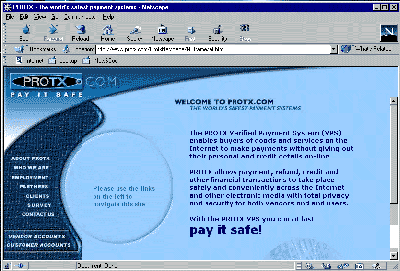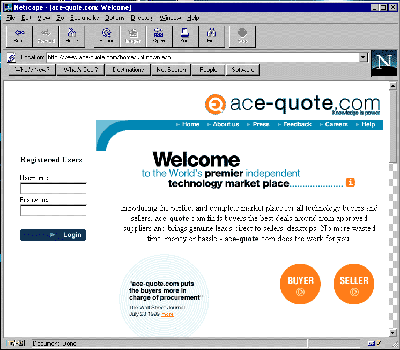E-Commerce is Dead !
Well not quite, but it got you reading, didn't it. The reason for the headline is a cautionary tail about the problems of buying via the Internet from other countries. The other day Mark bought a DVD from Amazon.com, the UK branch of this company not selling DVDs. All was fine so he ordered two more DVDs. When these arrived the carriers UPS wanted a cheque for £18.22 for £8.22 taxes and duty and £10 for an obscure Brokerage surcharge, all this for a delivery of a couple of DVDs with a total value of $29.88 ! This was because the order was above an arbitrary limit set by the powers that be. However this sort of obscene charge levied after the order has gone through is just the sort of thing to make people switch off to the idea of on-line shopping.
If I buy on-line I don't have any interest in where the goods are coming from, however if there are extra charges involved then the buyer should be advised at the time of placing the order and not held to ransom when the eagerly awaited goods are delivered. Now this fine group of countries that we belong to has always supported the ideal of free trade, in fact we have even been know to go to war so that other countries can have the benefit of our free trade. The Chinese will long remember our efforts to make sure that the opium trade was not stifled.
However if the government wants e-commerce to flourish then the question of import duties and taxes needs to be addressed so that prospective purchasers can be made aware of the charges. This could be done with some sort of look up database provided by the government that E-commerce providers could link to and pass the parameters of the sale so that the total value of the duty could be returned. This way the purchaser would be aware of the charges that will be levied. Providing this sort of facility would be a visible example of the government's willingness to promote e-commerce rather that just supplying yet more rhetoric from Westminster. The other possibility would be the removal of duties on Internet transactions totally but some how we can't see this happening.
Long live E-Commerce !
Mark visited the E-Commerce 99 show at the NEC the other day, half expecting to be disappointed. However this was not the case. After a drive up through a bout of rain storms, he arrived in Birmingham, to be greeted by a lively and vibrant show which brought back memories of some of the earlier computer shows when the industry was young and the stands were staffed by people who were interested and excited by the products. Almost all the stands that Mark talked to expressed delight at the quality of leads and the interest shown by the visitors. Some of this activity was perhaps fired by the statement two days before, by Tony Blair, that any British Business that has not embraced e-commerce will be out of business in two years. Whilst this is to many a wild claim, it is however very important for all businesses to look into how e-commerce will affect them. For some industries e-commerce will offer them little, but it is still important to investigate the consequences. After all, once the Millennium is over, the consultants will need something else to panic British business over. Certainly there were a few 'suits' at the show with a worried and almost panic-stricken look about them, trying to catch up on 'this Internet thing'. There were many companies there exhibiting their products, we only have space here to mention a few, so apologies to any that we do not mention. However we may be returning to some of these in future articles.

ProTX - The new kid on the block
One company that it was good to meet was a new on-line payment provider called Protx (www.protx.com). We had heard about them from a reader, Alexander Dermot, and they seemed to have some interesting products. Not least of these is the ability to handle small value purchases over the web, much lower than is normally possible with credit cards. This facility has earnt itself the name of 'micro payments'. Normally these systems require a program to be run on the clients machine in the form of a wallet that has to be filled up with money from a credit card, and then small amounts are deducted from this wallet as the user buys information or services from the web. We discussed a system for doing this offered by Barclay called BarclayCoin, unfortunately the take up of this has be abysmal. This type of technology is being closely watched by many industries as it offers a way of charging for information from the web. Before all you throw you hands up in horror at the free nature of the web being eroded. We feel that there is a place for both types of information. We would rather have to pay for some information, than not to have it on the web at all. Protex have turned this idea on its head and put the 'wallet' server-side. This means that there is no program for the user to download and install and the whole process becomes invisible to the user. The user can also access their 'wallet' from any web browser. The idea, is that a user going to any Protx enabled site can use micro payments once they have registered. Their credit card details are taken just once and £10 deducted from their account. When they visit a page that has a charge attached to it, this amount, usually in the order of pence, is deducted from the server side 'wallet'. Should the user want to unsubscribe to this service then the balance is refunded to them as a normal credit card refund. The system seems simple but effective, and it could open the way for a charging mechanism to allow existing paper publications to migrate to the web. Who knows we may see the likes of Maxim and PcPro distributed this way in the future?
Another company that was approaching the problems of delivering chargeable files over the web was Shop@ssistant (www.floyd.co.uk) This company have a variety of products most of which work client- side through JavaScript, and as such, are dependant on browsers behaving themselves. In fact Mark's version of IE5 would not display their site at all. Other machines were fine. When 'phoned, the techies at Shop@ssistant said that on occasions they have found particular installations of a particular browser to give problems. This can be caused by beta versions of a browser not being removed before the release version is installed. This is one of the problems with reliance on a client-side solution in the Internet environment. With an Intranet you have a fair amount of control over the browser type and version; this is obviously not the case with the Internet. Having said that, Shop@ssistant's solutions do enable you to offer e-commerce on any web space, as there are no server side components to run. This makes it very attractive for the smaller e-commerce solution, and again they provide links to Netbanx (www.netbanx.com) for credit card clearing.

'Can we quote you' - ace-quote.com]
We are always on the look out for new and interesting uses of the web. One of the exhibitors at the show was ace-quote.com Ltd (www.ace-quote.com). This company offers a system whereby buyers of IT equipment or consultancy can ask for a quote and suppliers can reply. It's a bit like the 'vendor quote me' conference on Cix. The suppliers have to pay £650 a year after their first free month's trial. The buyers pay nothing to use the service of course. The system seems to work well and is nicely thought out and although you can not see the requests appearing on the web site, this has been done for reasons of privacy. So, you place your request for more lovely computer bits and then you wait. Mark tried this with a request for the magnificent Mitsubishi 2020u monitor and within 5 mins the first quote came back. This was from a dealer just 10 miles down the road! The system is being updated at the moment and will have facilities for sellers to advertise offers to make the system a little more pro-active. This is an excellent example of an Internet application which seems to offer real value to its users.